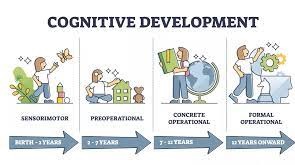Piaget's Theory of Development

Piget theory of development
Jean Piaget's theory of cognitive development is a well-known theory in the field of developmental psychology that focuses on how children develop their thinking abilities. Piaget's theory is based on the idea that children actively construct their understanding of the world around them through their experiences and interactions with their environment.Piaget identified four stages of cognitive development that children progress through from birth to adolescence:
Sensorimotor stage (birth to 2 years old): During this stage, infants learn about their environment through their senses and motor skills. They develop object permanence, which is the understanding that objects continue to exist even when they cannot be seen.
Preoperational stage (2 to 7 years old): During this stage, children learn to use symbols to represent objects and ideas. They engage in pretend play and begin to understand the perspectives of others.
Concrete operational stage (7 to 11 years old): During this stage, children begin to think logically about concrete events and can perform operations, such as addition and subtraction.
Formal operational stage (11 years old and up): During this stage, adolescents develop the ability to think abstractly and to reason logically about hypothetical situations.
Piaget's theory emphasizes the importance of active learning and hands-on experiences in cognitive development. It has been influential in shaping our understanding of how children learn and develop their thinking abilities.
